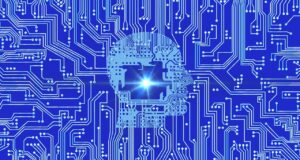Artificial intelligence is changing how people work. That can be scary. But for now, most jobs are still safe.

source: nytimes.com, contributed by FAN, Bill Amshey | image: pixabay.com
‘It’s been revolutionary’ |
|
Eli Snyder, a special-education teacher in Colorado, wanted to play basketball with his students. He had questions: How could he adapt the game for a child with cerebral palsy? And how could he help his students with autism play a highly stimulating activity? |
| ChatGPT had answers. |
|
The artificial intelligence chatbot had analyzed the internet’s vast amount of data, including information about disabilities and basketball. It used patterns it found in all that text to generate recommendations: Shrink the court size to reduce the distance players need to travel in wheelchairs. Lower the hoop and install a ramp leading up to it so students can roll the basketball into the net. Pair up players so each person has a buddy for support. |
|
Snyder could have found this information through a simple Google search. He turned to ChatGPT because it produced complete paragraphs instead of delivering links that would have left him with more clicking and synthesizing to do. The chatbot’s response helped him quickly write adapted lesson plans for each of his students. |
|
“It’s been revolutionary,” Snyder, 30, said. “What used to take me an hour now takes me five minutes.” |
|
Tech giants are heralding ChatGPT as revolutionary, too. With millions of users, the chatbot has started an A.I. arms race. Companies are rushing to release their own chatbots, and some seem eerily human. |
|
Beyond the excitement, the technology’s possibilities can feel scary — as if science fiction has become reality. ChatGPT has already inspired many people to ask: Will A.I. take my job? It’s a familiar panic, one that resurfaces every time a groundbreaking innovation emerges, like the car or the internet. Still, questioning how A.I. could replace jobs in the future misses a more urgent point: The platform is changing how people work right now. |
How workers use A.I. |
| Artificial intelligence already pervades our lives, powering voice assistants like Siri and Alexa, unlocking phones with facial recognition and auto-completing sentences in emails. ChatGPT gave millions of people the opportunity to test and interact with a version of the technology called generative A.I., which can write text and create images. |
| Many workers are already using the tool in their jobs. The chatbot has written home descriptions for real estate agents, job descriptions for hiring managers and sales pitches for marketers. |
| It excels at formulaic writing tasks because it mimics text that already exists online. House listings often feel canned, as do sales pitches, making it easy for ChatGPT to complete first drafts of those types of assignments. |
| “ChatGPT solves the blank page problem,” Cody Gough, a marketing professional outside of Chicago, told me. “The worst thing in the world is opening an empty document. ChatGPT helps you start.” |
The limitations |
| As we’ve covered in this newsletter, A.I. chatbots are flawed. They often make mistakes — like the one that led to a $100 billion drop in Google’s cumulative stock market value when it appeared in an ad. |
| The workers I spoke to mostly use ChatGPT as a brainstorming tool and writing aid. They say the work of chatbots is sometimes inaccurate and often of lower quality than they could produce themselves, but that chatbots can still be useful. |
| Alexia Mandeville, a video game designer in Texas, uses ChatGPT to help her brainstorm character names, conceive ideas for trailers and produce news releases for her games. “I’m making something that doesn’t need to be factual,” Mandeville said. Because her work is fictional, she added, ChatGPT needs to be creative, not accurate. |
| The chatbot is still the tool, not the creator. It can copy writing styles, often replicating our weird internet behavior, as my colleague Cade Metz wrote. ChatGPT’s outputs are only as good as its inputs, so it struggles to reason, use logic, discern the truth and write imaginative work. It has tried and failed to write science fiction, for example. The human capacity for original thought is keeping white-collar professionals employed, even as A.I. poses more of a threat to them than earlier advancements did. |
Freeing up more time |
| A.I. can’t do Snyder’s job of teaching music and gym classes. It can’t play the piano or the basketball game HORSE, and it can’t facilitate students’ social and emotional learning. But it gives Snyder more time for that work. |
| “Everyone is talking about how A.I. is going to replace us,” Snyder said. “I don’t agree with that. It’s going to free up more time at our jobs to do other, more productive things.” |
|
A.I. will continue to transform industries as companies integrate it into a variety of tasks, like customer service from virtual agents, predictive product inventory and medical tests. ChatGPT will probably eliminate some roles while creating new jobs. That’s already started to happen: Companies are hiring workers to test and sell the most effective chatbot queries. |
|
The technology will only get better. A.I. is designed to learn, and companies are investing billions to develop more powerful versions of the tool. At some point, chatbots could write finished products instead of just often-inaccurate first drafts — and eliminate far more jobs. |
| Until then, most of them are safe. |
